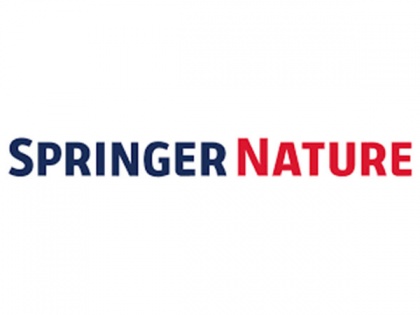A historic transformative agreement is signed between Springer Nature and the Indian Department of Atomic Energy to advance open research
May 8, New Delhi, India: Springer Nature and the Department of Atomic Energy (DAE), India, have reached a historic transformational agreement (TA). The arrangement is a major achievement for India’s research and academic community since it is the first TA by any publicly sponsored department in the country.

Through the agreement, articles published in Springer Nature’s 2,000+ hybrid journals across all disciplines will be read and published in Gold Open Access (OA), which is instantly available to everyone for use and reuse in an online journal or book. This will benefit all 50+ centers affiliated with the DAE. This agreement is a cooperative attempt to hasten the shift to open science and represents a critical turning point on the path towards giving everyone access to research discoveries.
The agreement is the most recent step in Springer Nature’s long-standing cooperation with the DAE, India. As part of this partnership, DAE and Springer Nature will cooperate to further the ideals of open access and eliminate obstacles to the distribution of academic research. The agreement includes a number of programs aimed at encouraging academic publishing’s creativity, openness, honesty, and accessibility. With Gold OA, Indian research will become more visible and impactful, and its worldwide reach will promote more international cooperation and information sharing.
Carolyn Honour, Chief Commercial Officer of Springer Nature Group, expressed her joy at the Department of Atomic Energy’s decision to continue their relationship with Springer Nature on their Open Science journey in her statement about the arrangement. For the first time, DAE has brought together all of its member subscriptions into one consortium, and we are excited to start this revolutionary journey to promote scientific advancement, expand publication opportunities, and reach Indian researchers. This agreement demonstrates not just our solid working relationships and track record of closing long-term, game-changing transactions, but also our dedication to advancing the field of academic communication and making research results widely available.”
“This is a historic moment for all the scientists and research scholars in the DAE family and the country,” stated Dr. Arun Kumar Nayak, Head of Nuclear Controls and Planning Wing (NPCW) at the Department of Atomic Energy, who also oversaw this project in the department, echoing these sentiments. “Our chairman was instrumental in taking these decisions.” This agreement also establishes the groundwork for several such agreements of a similar kind in the future, all of which will be crucial in guaranteeing that the scientific temperament of our nation is recognized globally.”
Dr. Deepali Kuberkar, the coordinator of One DAE, One Subscription (ODOS) and head of the department of library sciences at TMC, continued her remarks by saying, “ODOS is a significant turning point for DAE and its scientific community.” We are excited to work with Springer Nature in order to promote and expand the culture of learning in order to improve the world. Our priority from now on will be producing works of the highest caliber.”
Over 5,000 academics in DAE will benefit from the agreement thanks to streamlined operations and a simple author journey. The cooperation between the DAE and Springer Nature is a prime example of how to advance open access publication and encourage unrestricted knowledge sharing. This revolutionary deal will open the door for talks on a possible national or regional agreement and have a long-lasting effect on the Indian academic publishing scene.
A Transformative Agreement (TA): What is it?
Through TAs, member institutions may combine the expenses of open access (OA) publishing charges (APCs) with journal subscription (read) access. TAs provide writers with a simple means of adhering to funders’ OA obligations while also handling the expense and management of OA.
A Transformative Agreement unites open access publishing with subscription access under a single reading and publishing contract for a group of participating universities. This implies that scholars at such universities may read research published in subscription journals in addition to publishing under the “gold” open access approach. These agreements, which were initially signed in 2014 by Springer Nature and the Association of Dutch Universities, VSNU, Netherlands, simplify the management of open access (OA) for participating institutions as well as their researchers. These agreements also help to address the issue of some academic disciplines lacking OA funding (a centralized APC allows any researcher from the participating institution, regardless of academic discipline, to publish OA) and give researchers an easy way to comply with funders’ OA requirements. Furthermore, a wider range of researchers can benefit from the improved discoverability, increased citation, and increased usage of OA content.
On August 3, 1954, the Prime Minister issued a presidential order creating the Department of Atomic Energy (DAE), which is now directly under his supervision. DAE includes all fields pertaining to atomic energy applications, both power and non-power. The Department’s mandate encompasses the development of nuclear power technology, which includes waste management, construction and operation of nuclear power plants, uranium resource identification and processing, nuclear fuel fabrication, heavy water production, and reprocessing of spent nuclear fuel. In addition, DAE is in charge of sophisticated electronics and instrumentation, materials science, biological sciences, rapid reactor and fusion technologies, accelerator and laser technologies, etc. The Department conducts state-of-the-art research and development for the use of isotopes and radiation technologies for health care, food & agriculture, industry, and the environment as part of non-power uses of atomic energy.
Springer Nature has been promoting discovery for more than 180 years by offering the greatest support to the whole research community. We support researchers in their quest for novel concepts, ensure that the research we publish is substantial, reliable, and able to withstand critical examination, that it is distributed to all relevant audiences in the most effective manner, and that it can be found, accessed, utilized, repurposed, and shared. We help libraries and organizations with data and technological advances; we also provide groups excellent publication assistance.
As a publisher of research, Springer Nature is home to renowned brands such as Scientific American, BMC, Palgrave Macmillan, Nature Portfolio, and Springer.







